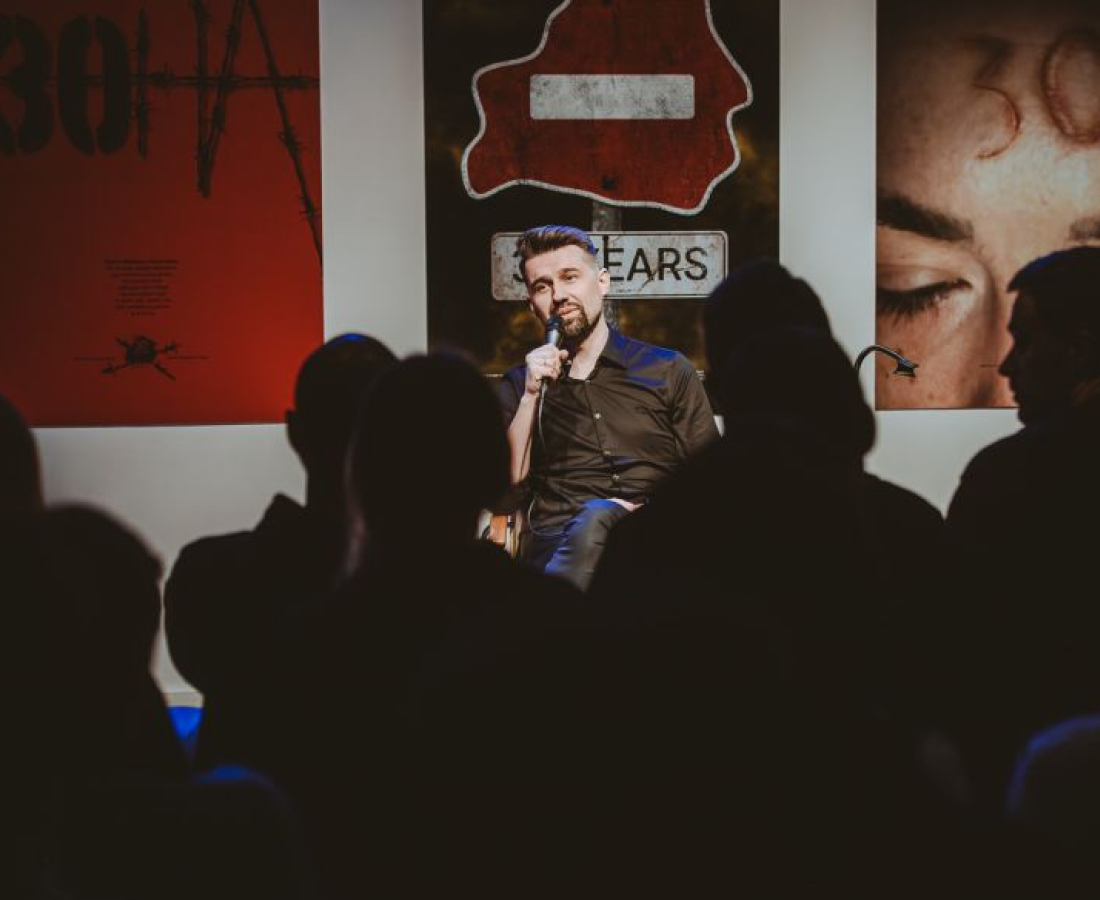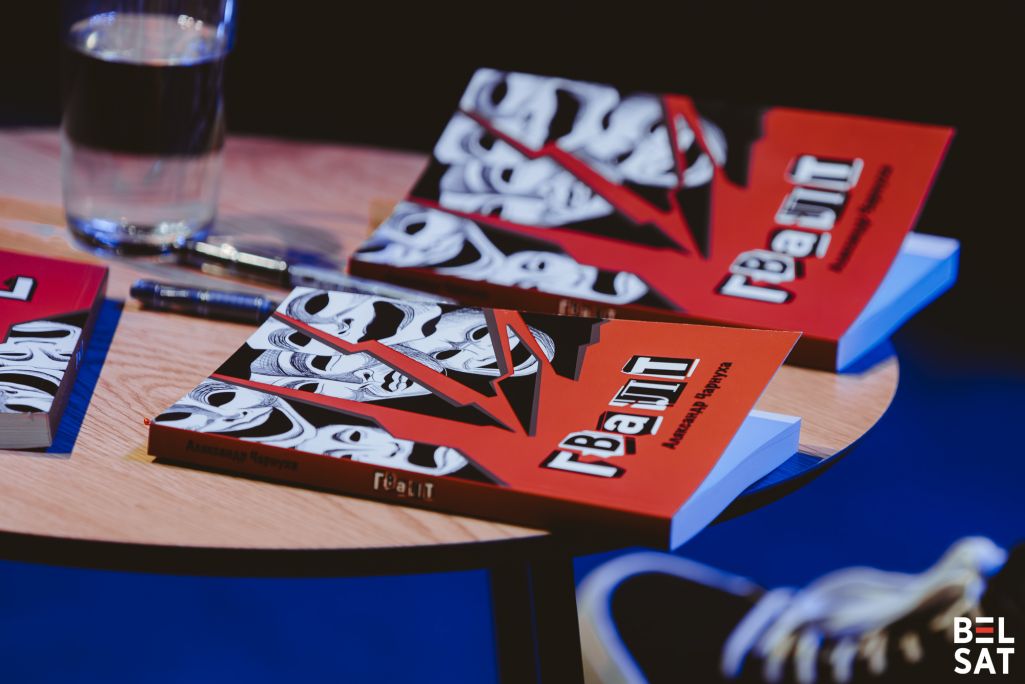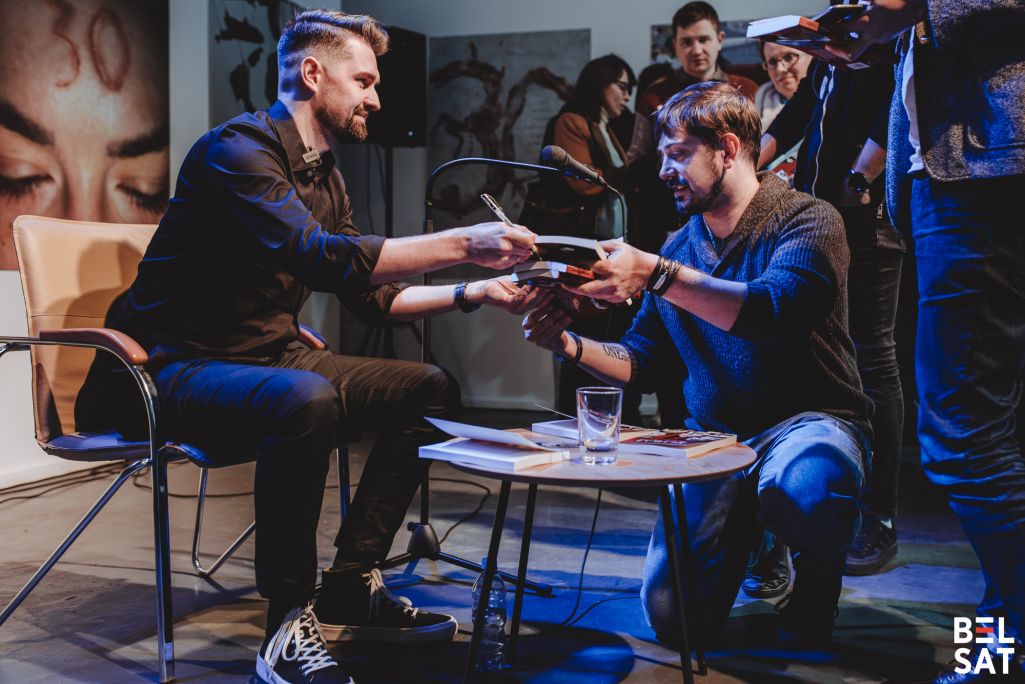
The event also marked the start of book sales. “Violence” can be purchased at the Warsaw bookstore Knihavka. Belsat was among the attendees.
As the event began, the lights in the hall suddenly went out, plunging the space into darkness and silence. One almost expected a shout of “Help!” But then something clicked, and the darkness gave way first to the soft sounds of music, and then to Aliaksandr Charnukha, sitting with a microphone against the backdrop of Artur Vakarov’s posters “30ona” and “Stop” (a road sign with the outline of Belarus).
Charnukha read “Globster,” one of the stories from his new book “Violence”. It is about the sea — “small, about the size of the Shklow region” — and the Black Nothing, washed up one day on the shore of our dreams…
"Nowhere else and never before was there such a Black Nothing. It is boundless and unique — and that is an unquestionable reason for pride. You say, the sea? But what of that sea?.. But the Black Nothing is one of a kind. We all must love the Black Nothing, for it makes us special," Charnukha’s voice declared.
In the bluish half-darkness, among the large posters from the project “30 Years of Dictatorship in 30 Posters” and the moody ambient music of Albert aka Scarlett, this sounded genuinely ominous. Light returned to the hall only at the period. “The sea is needed by everyone.” The performance of “Globster” was met with a burst of applause.
The author of “Violence” put the book aside, smiled, and thanked everyone who came to the event and those who supported the book’s publication through the Gronka platform.
Only when the lights were fully restored could the audience see how many people had listened to Aliaksandr Charnukha. The museum’s exhibition hall was packed to capacity, with many standing because there weren’t enough seats. Such attendance had not been seen there for a long time, at least for book presentations.
One of the event organizers later admitted that, in terms of visitor numbers, only the meeting with writer Sasha Filipenka in June 2024 could rival the “Violence” premiere. But one of our colleagues insisted that Charnukha actually attracted more readers.
During the event, the author answered more than 20 questions from the audience. One of them concerned Sasha Filipenka:
"Previously, when someone mentioned the writer Sasha, everyone knew they were probably talking about Sasha Filipenka (author of the novels Former Son, The Cremulator, Red Cross, and others). But now there is also Sasha Charnukha. Should Filipenka start worrying?" asked one of the attendees.
"Let’s leave competition to sports. There, there are objective criteria by which one team beats another. Art and literature are a subjective territory. Some like Filipenka, some Baharevich, some Alexievich, and some Charnukha. I would really like for us to be many and diverse. To write on different topics and engage with people. To expand the territory of Belarusian literature so that the whole world will talk about its phenomenon. That is what matters to me. Competitions with other writers do not interest me at all," Aliaksandr Charnukha replied.

The writer explained that he spent two years writing the book, which consists of 10 stories exploring violence in its various forms. This is Charnukha’s second book. His first, “Pigs,” written in 2020 in Russian, went through several editions and was translated into Belarusian. Unlike the sharply satirical “Pigs,” the new book is deeper and more serious, at times terrifyingly serious.
"Seeing how many topics for other stories about violence still exist around us, didn’t you get scared yourself? For example, what comes from the Lukashenka stage—isn’t that a manifestation of violence against all of us?" asked journalist Zmitser Lukashuk from the audience.
"As for the Lukashenka stage, these people have already received from me the ‘Bulbyany Bowdzil,’ and I received from them the status of ‘extremist,’ so we exchanged compliments. But indeed, one could keep writing this book endlessly, unfortunately. Yet in my mind, these 10 stories took shape… All plots are drawn from our life. And I am confident that they can serve as a basis for discussion," Charnukha said.
In general, the words “discussion” and “dialogue” were mentioned at the presentation almost as often as the key word “violence”. For instance, one visitor asked whether a dialogue is possible—or even necessary—with people who commit violence themselves.
"Dialogue is always necessary. It seems to me that nothing happens without dialogue. If someone is certain of their opinion and believes it is the only correct one, while dismissing other viewpoints as nonsense, this can lead to terrible consequences. One must speak with everyone who wants to talk and is ready for that conversation," the author replied.
Essentially, this was also an answer to the question of how to resist violence in contemporary society, asked by the audience. According to Aliaksandr Charnukha, dialogue is necessary, although, as he noted in a previous interview, violence in its essence is ineradicable.

Aliaksandr Charnukha expressed his belief that his book “Violence” could be useful even for the most predatory perpetrators. Perhaps even for the murderer of the Belarusian girl Liza, who was recently sentenced to life in Warsaw.
"Were there any overlaps with the hashtag #stopviolence?" asked a young woman from the audience.
"I sincerely believe that any violence is unacceptable. The point is that human nature is such that we cannot completely avoid violence in its various forms. What happened to Liza in Warsaw is terrible and unacceptable. I have no words to express how horrifying it is. And in this book, there is a story based on a real event, although it did not occur in Warsaw…", Charnukha said, briefly summarizing the plot of the story “Turtle”.
"Man is the cruelest and most ruthless creature in this world," he added.
The microphone continued to circulate in the audience. One Belarusian noted that everyone is already very tired of news about violence.
"Wouldn’t life be easier if we simply stopped noticing it?" asked an attendee.
"I also feel exhausted by this. Information comes at us from all sides, and we live in a very fast-paced time. We reach a point where it is simply impossible to process such a vast amount of information about violence. The only solution is to filter it, to see what you can influence and what you cannot. To change yourself, to help yourself first, so that you can help others later. Closing your eyes to external violence does not mean it disappears. If you cover yourself with a blanket over your head, the ghost under your bed does not vanish. When you get up, it will still grab you by the heel…", reflected the author of “Violence”.
Charnukha was asked whether it is easier to write fiction or music criticism (“These are completely different things”). They asked if “Violence” can be read from any point (“Yes, you can even start with the last story, ‘Splitting the Boar’”). They asked what soundtrack he would choose for his book (“Writing is a kind of meditation; silence is necessary”).
"Suppose you were living not in Poland but in some warm country now—would you still have called your book ‘Violence’ and written about the same things?" another question came from the audience.
"A hint that this book was born from this Warsaw darkness, right?.. There is some truth to that. Every winter morning I wake up in Warsaw and think: what am I even doing here, in this darkness? But I think that if I were living in some sunny country now, I would still write this book about exactly this… These plots seem sewn inside you. All our stories are our personal experience, one way or another," answered Aliaksandr Charnukha, who admitted he had already packed his suitcases to take his new book on a major tour in America from January 29 to March 9 (which, of course, is not sunny everywhere either).

The discussion with Charnukha at the Museum of Free Belarus lasted over an hour. Afterwards, the writer held a book signing. The line of readers who had already purchased the book (price – 50 zlotys, approximately 11 euros) stretched for over ten meters.
One of the last questions during the meeting concerned autographs:
"How would you sign your book for Siarhei Mikhalok and Max Korzh, if, let’s imagine, they came to the presentation?" asked one of the participants with a provocative smile (Charnukha has been very critical of these performers in his “Ministry of Sepultura”).
"I would be very surprised if they came here. But if they did, I would gladly sign the book for them, just like for all other visitors. They are neither better nor worse than anyone else. What’s the big deal? I would shake hands, hug Mikhalok, and say: ‘You are dear to me!’ How would I sign the book? ‘Take care of yourself!’ I would wish them a life with less violence," replied Aliaksandr Charnukha.
Aliaksandr Charnukha’s book “Violence” was published by the Belarusian publisher Yanushkevich. The illustrations for the stories were created by the author’s wife, Taisia Charnukha. The publication of the book was made possible thanks to supporters who contributed to the project via the Gronka crowdfunding platform. Their names are listed on the last page of the edition.
Original article: belsat.eu